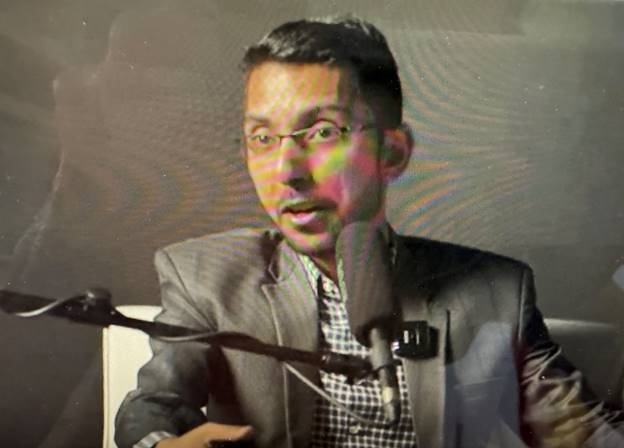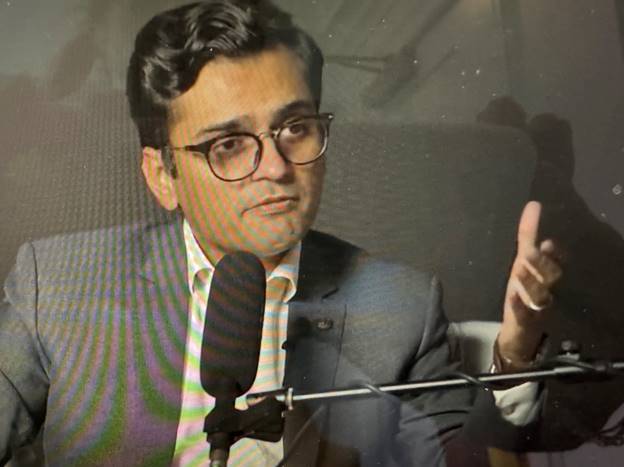

Taimur Farhad Khan

Usama Nizamani
InferTalks Hosts Taimur Farhad Khan to Discuss Global Issues
By Elaine Pasquini
Washington

Usama Nizamani, senior research journalist and Stimson Center visiting fellow, spoke with Taimur Farhad Khan, research associate at the Islamabad Institute of Strategic Studies, on the June 27, 2024, episode of Infer Talks, a digital platform conducting policy analysis on global issues. The two discussed a myriad of topics including the Russia-Ukraine conflict, the growing Russia-China partnership, Russia’s expanding influence in South Asia, and the intricacies of Russia’s relationship with Pakistan.
Speaking on the Russia-Ukraine conflict, Khan said that Ukrainian morale is going down and President Zelensky’s attitude and demands with regard to negotiating with Russia are “unrealistic.” Presently, Ukrainians have realized that very soon they will return to the negotiating table because “there is not going to be any settlement whatsoever on military terms, but it can only be achieved through political means, and they will have to return to negotiations with the Russian Federation.”
Responding to a question on China’s peace plan for the war, the superpower’s involvement is significant, he noted, and its proposal is receiving attention from both Russia and Ukraine because China is a major global player and has a lot at stake in the entire region, particularly with regard to economic and strategic issues, he pointed out. “Because of the strategic relationship that Russia and China now share with each other, Russia gave a very positive response to the peace plan given by the Chinese. But Ukraine knows that if it goes for any peace plan being offered it will lose a significant part of its territory, plus Zelensky believes that if he agrees to any part of a peace plan it will be political suicide for him.” Thus, Khan does not envision any bright prospects for a peace plan to materialize in the near future.
Russia’s footprint in South Asia, however, will expand in the coming decade, he argues. “In the coming years, I strongly believe that the Russian footprint will increase on the Asian continent primarily in South Asia and Southeast Asia. The major reason for that is because the Europeans have closed almost all their doors that were leading towards Russia, and Russia has now realized that it is going to take a very long time to establish some semblance of normal relations with the Europeans as it did before the Russia-Ukraine conflict took place.”
Realizing that Asia is the most populous region of the world with the largest number of growing economies, President Putin has reoriented his economic, political and strategic policy eastward. “So, yes, Russia is definitely trying to increase its footprint on the Asian continent,” Khan contended. “And in the years to come we will see more and more Russian influence and presence in the region.” Already, there is an increased Russian presence in Afghanistan, for example.
Currently, Russia enjoys a good strategic relationship with Iran, he noted. Despite Western sanctions, the Islamic Republic is one of the few countries that has actually supplied Russia with military technology and ammunition. In addition, Russia shares a good relationship with China, India and Myanmar. “Although it is politically and diplomatically isolated, Russia is one of the few major countries that has actually assured the sustenance of Myanmar’s military junta,” he explained. “It has good cordial relations with countries like Sri Lanka, the Maldives and the majority of the ASEAN countries, which collectively are the fourth or fifth largest trading partner of the Russian Federation.”
Lastly, addressing the relationship between Russia and Pakistan, Khan pointed out that historically Pakistan has been a Western-oriented country especially during the Cold War owing to its own national orientation, foreign policy and national security interests.
“Pakistan has always been a major US partner which naturally made us sit on the opposite side of the table from the Russian Federation or the earlier Soviet Union,” he related. Russia does want to have cordial relations with Pakistan and vice versa. But there are several economic, strategic and political constraints on Russia as well as Pakistan which have slowed down the progress of bilateral relations. “In the near future, we can see that Russia’s influence in the region will increase and its relations with Pakistan will also improve significantly.”
In addition, “Pakistan and Russia both share the desire to have a very strong, cordial and strategic partnership with each other,” Khan noted. “Pakistan has a lot to offer to the Russian market and vice versa. The two countries also share similar views and interests in multilateral forums like the United Nations and ASEAN.” And now Pakistan also wants to be a part of BRICS, an organization co-founded by the Russian Federation, consisting of Brazil, Russia, India, China, South Africa, Iran, Egypt, Ethiopia and the UAE.
“I believe that if Pakistan wants to enhance its relationship with Russia it has to go for internal balancing on its part, increase its industrial base and strengthen its economy,” Khan stated. “To make its markets more attractive for Russian investment, Pakistan must also strengthen its institutions and ensure the rule of law.”
(Elaine Pasquini is a freelance journalist. Her reports appear in the Washington Report on Middle East Affairs and Nuze.Ink.)

